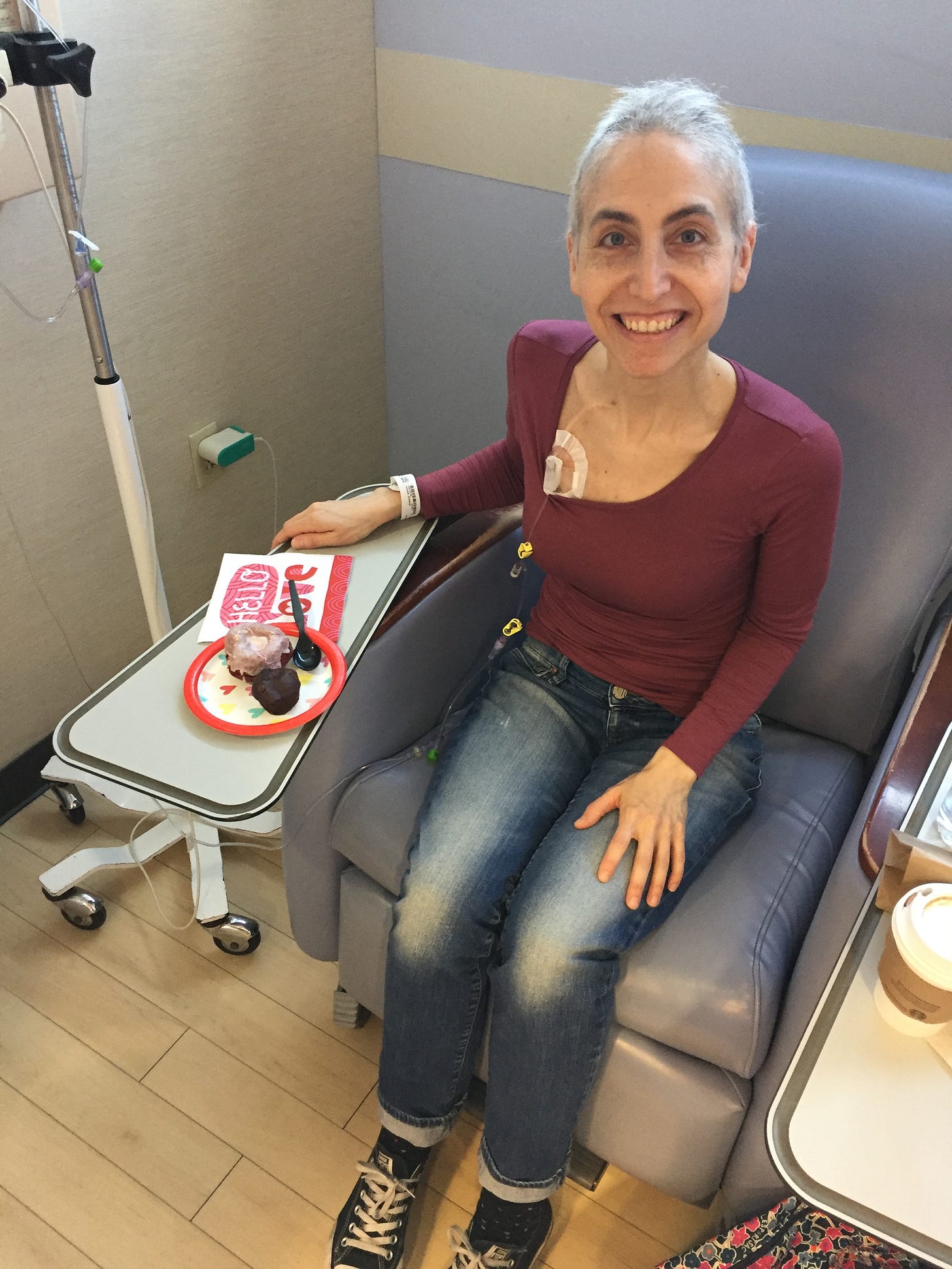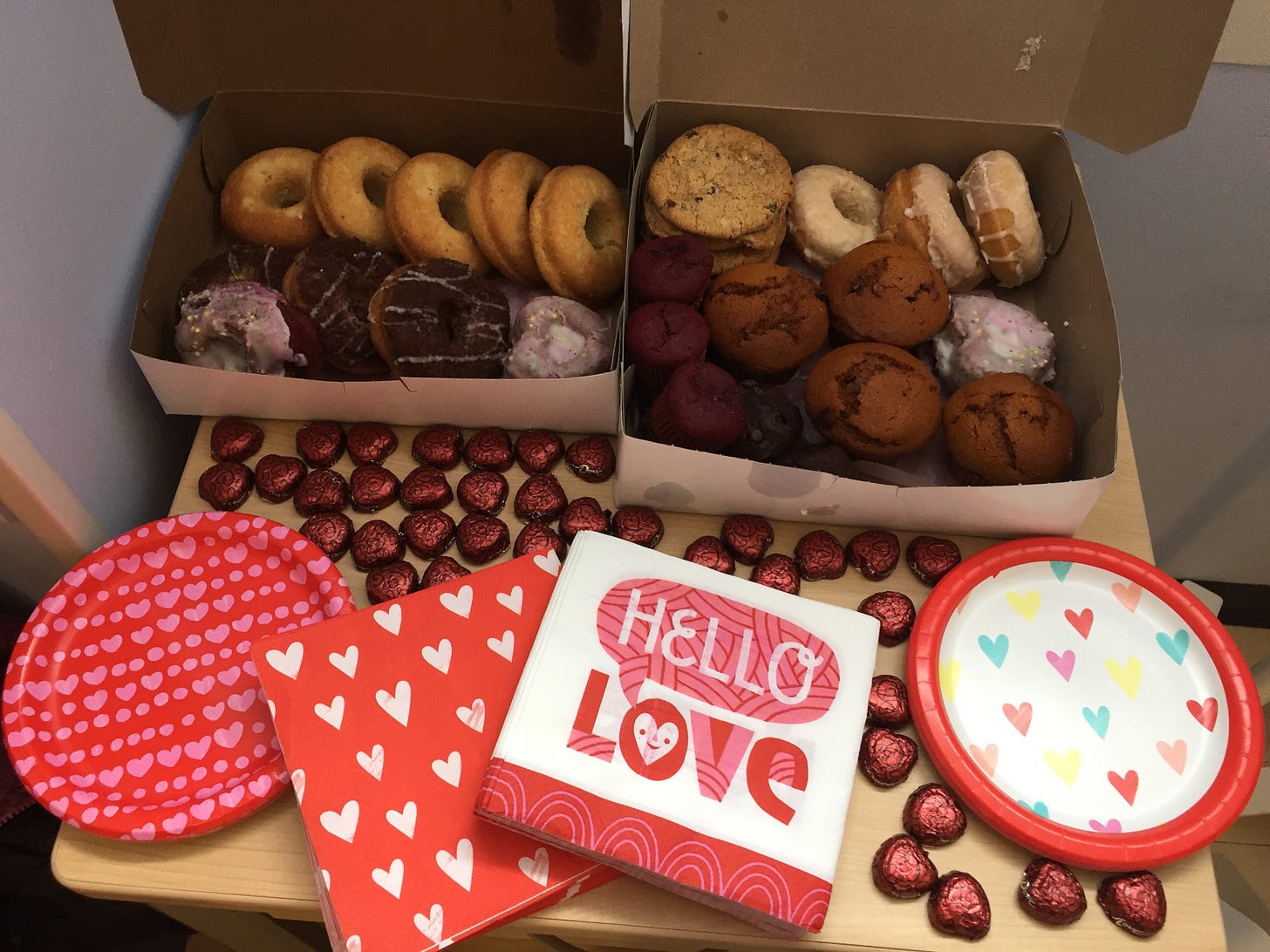Today I’m sharing a very rare un-paywalled post with a peek behind the paywall! 👀 If you’d like to read my newsletter every week, as well as have access to the complete archive, please become a paid subscriber. Thank you for supporting independent writing!
Early on after being diagnosed with ovarian cancer six years ago, I read a quote by a cancer survivor that said if you’re feeling okay at your chemotherapy appointment, try to bring some joy to another patient at the infusion center who’s having a harder time than you. I took this mantra to heart: With the exception of one day when I had a splitting headache and the person in the neighboring chemo suite was blasting a Jerry-Springer-esque talk show, I always felt good at my chemotherapy appointments — so I focused on spreading joy to others.
When I went back for my second round of chemo after recovering from my debulking surgery to remove the cancer and all affected organs, I had a choice: I could either schedule my weekly chemotherapy appointments on Tuesdays or Thursdays. I picked Thursday because Valentine’s Day was a couple of weeks away, on a Thursday, and I wanted to throw a party.
For my Valentine’s Day party at the infusion center, a bakery in Manhattan donated two boxes of baked goods. I bought Dove Dark Chocolate Hearts, Valentine’s Day paper plates and napkins, and a box of perforated animal-themed valentines that came with matching temporary tattoos.
While I was checking-in for my appointment the morning of Valentine’s Day, I got into a conversation with a woman in her sixties who was behind me on line. She was there with her husband, who was being treated for lung cancer. It was his first chemotherapy appointment and he was scared, she told me.
I invited her to my Valentine’s Day party, and when she stopped by my chemotherapy suite, I told her to bring a plate of baked goods back to her husband in his chemo suite. Her husband loved their cat, she told me. “Would it be okay if I take a cat tattoo for him, too?” she asked.
“Of course!” I smiled, digging one out of the box.
Eventually, I exchanged contact information with her and we kept in touch. A few months later, after I’d finished treatment, I checked my email one Thursday night and saw a message from her. She told me that when she and husband were at the infusion center that day, they met a woman who was there for her first chemotherapy appointment, and she was scared. So, she wrote to me, she told that woman about the beautiful lady with the big smile who comforted them on their first day there, and then she comforted the woman and told her that one day she’d pass the kindness on to someone else, too.
“I paid it forward,” she wrote. “Had to let you know you planted seeds of love and kindness.”
A few hours after receiving her email, I woke up in the middle of the night sobbing, overwhelmed by the power and responsibility I had to do good in the world; how my acts of kindness rippled out beyond what I could see.
We all have that power, if we choose to use it.
Before being diagnosed with cancer, I was missing a sense of purpose, particularly in my work. For a long time, I’d felt like I was on autopilot, just going through the motions. I wanted to feel more fulfilled on a day-to-day basis, and make a bigger difference in the world while I was at it.
In the months leading up to my diagnosis, I was just beginning the process of trying to find more meaningful work. I didn’t know exactly what a new field or career would look like, so I was doing some preliminary research: I’d scheduled a few networking conversations with people who worked in the mental health field, and wondered if I should go to social work school to be a therapist — though realistically, and financially, that seemed unlikely.
After my diagnosis, I had to cancel the remaining networking meeting on my calendar, and it seemed like my search to find more fulfillment was going to have to be on hold.
Only… it actually wasn’t. Being diagnosed with cancer and going through treatment gave me the purpose I’d been searching for. I was happiest when I was at oncology checkups and chemotherapy appointments. I adored my gynecologic oncologist, my chemo nurse, and my whole oncology team. I loved feeling so cared for by them at and in between my appointments. And I really loved how I could help other people who were dealing with cancer — with information, resources, a listening ear, or words of comfort and a smile when they were scared.
Driven by this newly discovered sense of purpose, I documented my experience with ovarian cancer on social media and collected and curated resources on my website. Somehow, I decided, I wanted to make this a career.
As more and more time passed after finishing treatment — and I had to emerge from my comfortable cancer bubble and reenter the “real world” — my sense of purpose got chipped away at. The discouragement started when I tried to take my passion into the workplace.
About eight months after completing treatment, I had an interview at a hospital for a part-time position. The HR representative who interviewed me was dismissive. Looking at the advocacy work I’d listed on my resume about the social media and blog content I was creating, he disparaged that it was all unpaid and self-initiated, insinuating that that meant it didn’t count. I tried to convince him that it mattered anyway, but I didn’t get the job.
A couple years later, I applied to another job in a hospital: a communications role as a writer and editor for the hospital’s publications. The form-letter rejection I got encouraged me to apply for other roles at the hospital “where my experience was a better fit.” Writing and editing is literally the only job I’m remotely qualified to do at a hospital! I thought to myself, pissed.
The list of disappointments goes on: I wrote a book proposal about my experience with ovarian cancer and tried to get an agent. I sent out dozens of query letters, but didn’t get any takers. “You don’t have enough followers,” “It’s hard to sell memoirs,” “I can’t deal with this topic because my friend/family member/etc. has cancer,” and my favorite, “There are already so many books about cancer,” were the common responses I received. All types of cancer are different and there are hardly ANY books about ovarian cancer! I screamed in my mind at the rejection emails on screen.
As I’ve tried to do work that aligns with the vision I discovered when I was diagnosed with ovarian cancer, I’ve received many more rejection emails and non-responses. It’s caused me to doubt myself, punctured my self-esteem, deflated my enthusiasm, and made me forget why I want to do this kind of work in the first place.
Around the time I finished treatment, I heard a quote by cancer survivor and author Anita Moorjani that stuck with me. She said:
“Remission means ‘Remember your mission.’”
Last month, I had my biannual checkup with my gynecologic oncologist. I was diagnosed with stage 3c ovarian cancer six years ago this month, and I’ve been in remission for five and a half years. At my checkup, the gyn onc fellow said that five years in remission is a big milestone, and my gynecologic oncologist told me that I now graduated to only needing to come in for appointments once a year instead of every six months.
At the end of every appointment, I update my oncology team on my current projects pertaining to cancer. Some of these projects are volunteer, some are self-initiated, and some are paid — but they all count. My gynecologic oncologist and his staff are always so excited to hear what I’m up to.
At my recent appointment, they told me that they’re proud of me, and that I’m doing so many good, helpful things. “You have so much energy!” my gyn onc said to me when I rattled off my recent accomplishments.
Ha! I thought. If he only knew how many naps I take!
Despite my ongoing fatigue, I left that appointment feeling so energized — not only because of my graduation-to-once-a-year-checkups status, but because my gyn onc and the rest of my oncology team reminded me of my mission. It felt so good to get a glimpse of myself as they see me — passionate, driven, doing a lot to help others, and, apparently, energetic! They didn’t see all the rejection and disappointment, the self-doubt and battered self-esteem.
Being diagnosed with cancer and going through treatment gave me so much perspective on what really matters, and that experience enabled me to see and know my own strength. Once I went back to “real life” after treatment, though, it was very difficult to hold on to that knowledge and perspective. But…
“Remission means ‘Remember your mission.’”
I need reminders to reconnect with the perspective and sense of purpose I discovered six years ago after my diagnosis. My gyn onc appointment last month was one.
This is the ongoing reminder I need:
I have a purpose and a mission that no one can take away from me — not HR reps or literary agents or the numerous people who don’t respond to my emails and LinkedIn requests. I have immense power — the power to comfort someone who’s scared, share helpful information just when someone needs it, and plant seeds of love and kindness that ripple out and extend far, far beyond me.
I don’t want to ever forget it.










